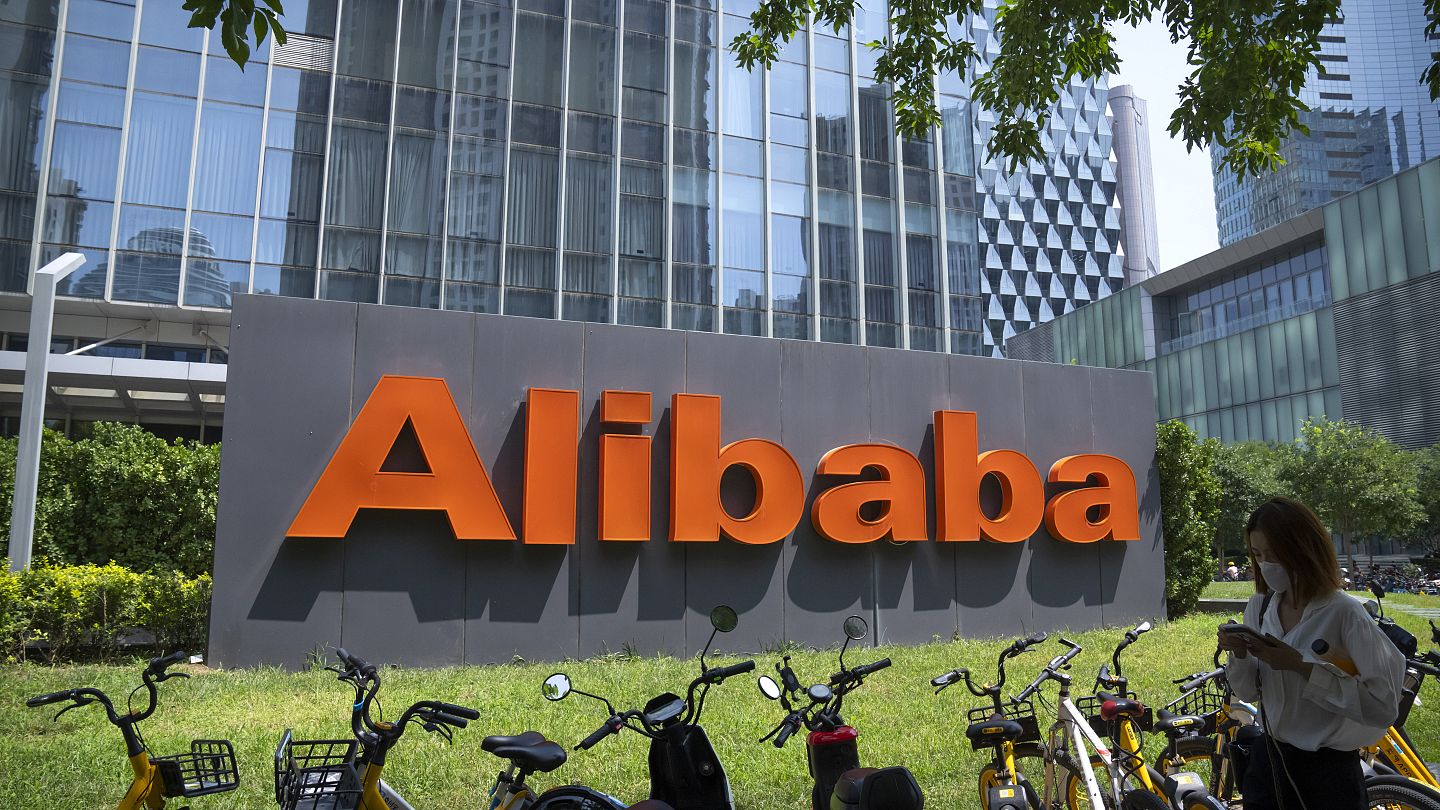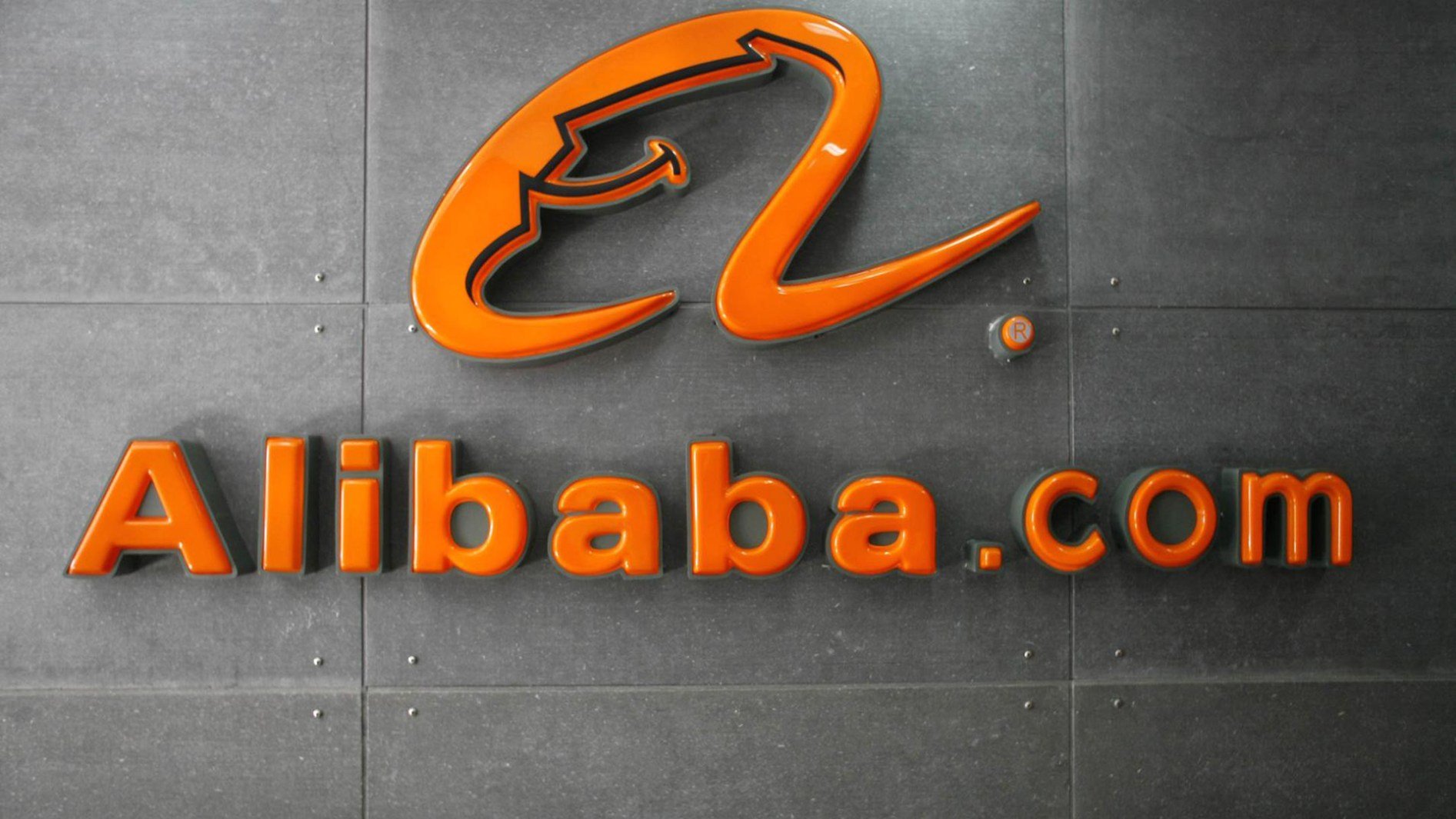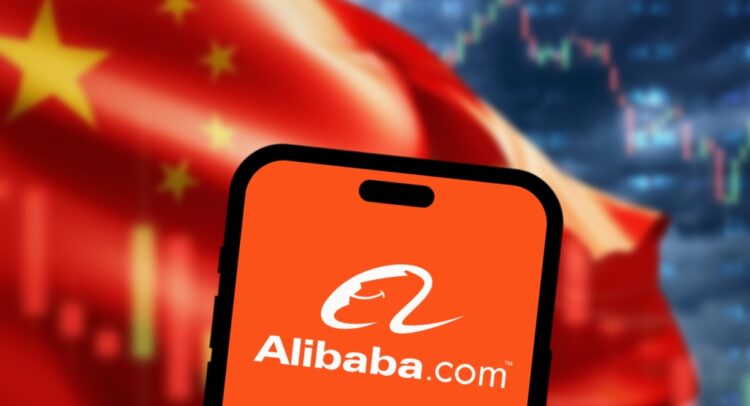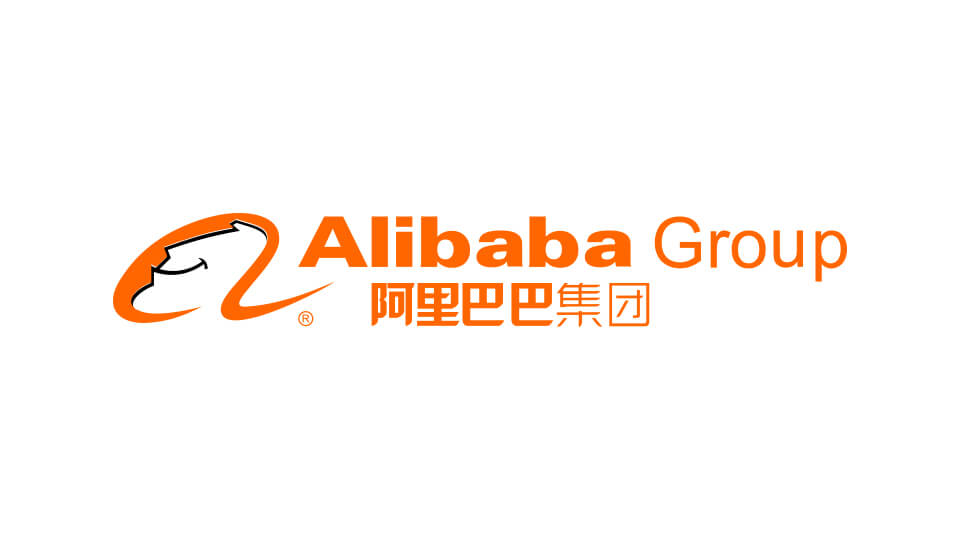Alibaba (NYSE:BABA) Faces Challenges but Shows Potential for Recovery

- Revenue growth shortfall in Q1 FY2025, primarily due to a decline in the China commerce segment.
- Financial health indicators such as a P/E ratio of 23.61, P/S ratio of 1.35, and EV/Sales ratio of 1.29 reflect a balanced market valuation.
- Strategic investments in AI and a solid liquidity position with a current ratio of 1.41 suggest potential for recovery and growth.
Alibaba (NYSE:BABA) has been navigating through a period marked by significant challenges, including geopolitical tensions, a downturn in consumer spending within China, and a heightened competitive landscape. These factors have collectively contributed to a decrease in the company's valuation multiples. Despite these hurdles, Alibaba reported a revenue growth shortfall in the first quarter of fiscal year 2025, primarily attributed to a decline in sales within its China commerce segment. However, Alibaba's management remains optimistic, signaling a potential recovery in the forthcoming quarters. This optimism is further bolstered by a resurgence in the company's cloud segment and an intensified focus on artificial intelligence (AI) initiatives.
The financial metrics provided by Susquehanna on August 19, 2024, offer a detailed insight into Alibaba's current financial health and market valuation. With a price-to-earnings (P/E) ratio of approximately 23.61, investors seem to exhibit a moderate level of confidence in Alibaba's future earnings potential, despite the recent challenges. This is further evidenced by the company's price-to-sales (P/S) ratio of about 1.35 and an enterprise value to sales (EV/Sales) ratio of roughly 1.29, indicating a balanced market valuation in relation to its sales figures.
Moreover, Alibaba's enterprise value to operating cash flow (EV/OCF) ratio stands at approximately 7.25, highlighting the company's efficiency in generating cash flow from its operations relative to its valuation. This metric, coupled with an earnings yield of around 4.24%, suggests a reasonable return on investment for shareholders. Additionally, the company's debt-to-equity (D/E) ratio of about 0.22 demonstrates a conservative use of debt in financing its assets, which is a positive sign for investors concerned about financial stability.
The current ratio of approximately 1.41 further indicates Alibaba's capability to meet its short-term obligations, showcasing a solid liquidity position. This financial stability, combined with strategic investments in growth areas such as AI, positions Alibaba to potentially rebound from its current challenges. As highlighted by Seeking Alpha, despite the initial setbacks in its core retail business, Alibaba's management is optimistic about a growth rebound, supported by the company's evolving business strategies and market adjustments.
| Symbol | Price | %chg |
|---|---|---|
| BELI.JK | 378 | -0.53 |
| MAPA.JK | 715 | -0.7 |
| BUKA.JK | 168 | -0.6 |
| ACES.JK | 456 | -0.88 |

Alibaba's Stock Upgrade by Bernstein: A Sign of Confidence and Growth Potential
- Bernstein upgraded Alibaba's (NYSE:BABA) stock to "Outperform" and increased the price target from $167 to $200.
- Alibaba is recognized for its potential in AI and cloud computing, with a projected stock price increase of 32%.
- Despite a recent 4.11% decrease in stock price, Alibaba's market capitalization and trading volume indicate strong investor interest.
On October 10, 2025, Bernstein upgraded Alibaba's (NYSE:BABA) stock to "Outperform," with the stock priced at $173.68. Bernstein also increased Alibaba's price target from $167 to $200, as highlighted by TheFly. This upgrade reflects growing confidence in Alibaba's strategic direction and potential for growth in the coming months.
Alibaba, a leading Chinese e-commerce company, is gaining recognition in the AI and cloud computing sectors. Analysts have identified Alibaba as a top pick, projecting a potential stock price increase of 32%. This optimism aligns with Bernstein's upgraded price target, suggesting a positive outlook for Alibaba's future performance.
Despite the positive outlook, Alibaba's stock price has decreased by 4.11%, or $7.44, to $173.68. During the trading day, the stock fluctuated between $172.30 and $178.78. This volatility indicates that while there is potential for growth, investors should remain cautious of market fluctuations.
Alibaba's market capitalization is approximately $402.76 billion, reflecting its significant presence in the market. The company's stock has seen a 52-week high of $192.67 and a low of $80.06, showcasing its potential for recovery and growth. With a trading volume of 21,078,761 shares on the NYSE, investor interest in Alibaba remains strong.
As Alibaba ventures further into AI and cloud computing, Wall Street is closely monitoring the associated risks. While these sectors offer growth opportunities, they also present challenges that could impact Alibaba's stock performance. Investors should consider these factors when evaluating Alibaba's potential for future success.

Jefferies Upgrades Alibaba (NYSE:BABA) to "Buy" with a Higher Price Target
- Jefferies has upgraded Alibaba (NYSE:BABA) to a "Buy" recommendation and raised the price target from $178 to $230.
- Alibaba's strategic investments in AI and its dominance in China's cloud services market are key drivers of its stock performance.
- The stock has seen a significant rally, surging by 44% over the past month and doubling year to date with a 110% increase.
On September 29, 2025, Jefferies updated its rating for Alibaba (NYSE:BABA) to a "Buy" recommendation. At the time of this announcement, the stock was priced at $171.91. Jefferies also raised Alibaba's price target from $178 to $230, as highlighted by TheFly. This update reflects growing confidence in Alibaba's strategic direction and market potential.
Alibaba, often called the "Amazon of China," operates major e-commerce platforms like Taobao and Tmall. It also has a strong international presence through AliExpress, Daraz, Lazada, and Trendyol. Alibaba's cloud unit dominates China's cloud services market, holding over one-third of the share, making it the leading provider in the country.
Despite a modest 10% organic revenue growth in the June quarter, Alibaba's stock has surged by 44% over the past month and has more than doubled year to date, with a 110% increase. This rally is largely due to Alibaba's strategic investments in artificial intelligence (AI) and the perceived undervaluation of its stock earlier this year. The company plans to invest at least $52 billion in AI, which has been a key driver of its recent stock performance.
In comparison, CoreWeave has been a standout performer since its IPO in late March 2025, outpacing Alibaba in growth. However, relying solely on past performance for investment decisions is not advisable. Both stocks have shown positive trends this year, but Alibaba's strategic moves into AI and its strong market position make it a compelling investment opportunity.
Currently, Alibaba's stock is priced at $171.91, reflecting a decrease of 2.03% or $3.56. The stock has traded between a low of $169.70 and a high of $172.76 today. Over the past year, BABA has reached a high of $180.16 and a low of $80.06. The company's market capitalization is approximately $399 billion, with a trading volume of 15.89 million shares on the NYSE.

Alibaba Group Holding Limited's Financial Performance Analysis
- Alibaba Group Holding Limited reported earnings below expectations with an EPS of $2.06 and revenue of $34.56 billion.
- The company's financial ratios such as P/E ratio of 17.16, price-to-sales ratio of 2.25, and enterprise value to sales ratio of 2.35 provide insights into its market valuation.
- Alibaba's low debt-to-equity ratio of 0.25 and a current ratio of 1.55 indicate a strong financial position and stability.
Alibaba Group Holding Limited, listed on the NYSE as BABA, is a major player in the e-commerce industry. The company is known for its vast online marketplace and various digital services. Despite its strong market presence, Alibaba's recent earnings report on August 29, 2025, showed an EPS of $2.06, which was below the expected $2.13. The revenue also fell short, coming in at $34.56 billion against the anticipated $34.68 billion.
During the Q1 2026 earnings conference call, key figures such as CFO Hong Xu and CEO Yongming Wu discussed Alibaba's financial performance. The call drew attention from major financial institutions like JPMorgan Chase, Citigroup, and Morgan Stanley. These institutions were keen to understand Alibaba's strategic direction, especially after the earnings miss.
Alibaba's financial metrics provide a deeper understanding of its market valuation. The company's P/E ratio of 17.16 suggests how the market values its earnings. Meanwhile, the price-to-sales ratio of 2.25 and enterprise value to sales ratio of 2.35 reflect the market's valuation of its revenue and sales, respectively. These ratios are crucial for investors assessing Alibaba's financial health.
The enterprise value to operating cash flow ratio of 14.33 indicates how the market values Alibaba's cash flow from operations. This metric is important for understanding the company's ability to generate cash. Additionally, Alibaba's earnings yield of 5.83% offers insight into the potential return on investment, which is a key consideration for investors.
Alibaba maintains a relatively low debt level, with a debt-to-equity ratio of 0.25. This suggests a strong financial position, as the company relies more on equity than debt. Furthermore, a current ratio of 1.55 indicates Alibaba's capability to cover its short-term liabilities with its short-term assets, highlighting its financial stability.

Alibaba Group Holding Limited (NYSE:BABA) Earnings Preview and Financial Health
- Alibaba is set to release its quarterly earnings with an estimated EPS of $2.13 and projected revenue of $35.34 billion.
- The company's valuation appears undervalued at 14 times its forward earnings, despite significant investments in AI and cloud technologies.
- Financial metrics reveal a strong potential with a P/E ratio of approximately 15.52 and a low debt-to-equity ratio of 0.25.
Alibaba Group Holding Limited, trading on the NYSE under the symbol BABA, is a major player in the global e-commerce and technology sectors. The company is set to release its quarterly earnings on August 29, 2025, with Wall Street analysts estimating an earnings per share (EPS) of $2.13 and projected revenue of approximately $35.34 billion. Alibaba's diverse portfolio includes significant advancements in artificial intelligence (AI) and cloud technologies, positioning it as a leader in these rapidly growing sectors.
Despite its aggressive $53 billion investment in AI, Alibaba, like other Chinese tech giants such as Tencent and Baidu, faces challenges in demonstrating significant returns from these investments. However, Alibaba's current valuation appears deeply undervalued, trading at 14 times its forward earnings. This undervaluation persists despite the company's robust growth in both the cloud and AI sectors, as highlighted by its successful transition from a primary focus on e-commerce to a more diversified portfolio.
Alibaba's core commerce operations alone justify most of its market capitalization, effectively rendering its cloud and international businesses as additional value at no extra cost. A sum-of-the-parts analysis supports this view, indicating that the market may be overlooking the full potential of Alibaba's diversified business model. The company's strategic restructuring efforts, such as the merger of Ele.me and Fliggy, are expected to enhance its long-term value and contribute to its growth trajectory.
The company's financial metrics further underscore its potential. Alibaba's price-to-earnings (P/E) ratio is approximately 15.52, while its price-to-sales ratio stands at about 2.03. The enterprise value to sales ratio is around 2.14, and the enterprise value to operating cash flow ratio is approximately 13.02. These figures suggest a market valuation that may not fully reflect Alibaba's growth prospects and strategic initiatives.
Alibaba's financial health is also supported by a low debt-to-equity ratio of 0.25, indicating a conservative use of debt in its capital structure. The company maintains a current ratio of 1.55, demonstrating its ability to cover short-term liabilities with its short-term assets. With an earnings yield of 6.44%, Alibaba offers an attractive risk-return profile for investors, particularly as the company continues to advance in the cloud and AI sectors.

Alibaba Group Holding Limited (NYSE:BABA) Earnings Preview and Financial Health

Alibaba Group Holding Limited (NYSE:BABA) Maintains Buy Rating Amid AI Growth
- Benchmark reiterates its Buy rating for Alibaba, reflecting confidence in its AI-driven revenue growth.
- Alibaba's stock price shows a slight increase, indicating investor optimism in its technological advancements.
- The company's market capitalization and trading volume highlight its strong market position and active investor interest.
Alibaba Group Holding Limited, trading under the symbol BABA on the NYSE, is a major player in the e-commerce and technology sectors. The company is known for its online retail platforms, cloud computing services, and digital media. Alibaba competes with other tech giants like Amazon and Tencent. Recently, Benchmark reiterated its Buy rating for BABA, indicating confidence in its future performance.
On July 21, 2025, Benchmark maintained its Buy rating for Alibaba, with the stock price at approximately $120.05. This decision aligns with the company's growth in the artificial intelligence sector, which is driving revenue growth. The stock price reflects investor optimism, as it saw a 2.46% increase due to expanding AI capabilities.
Currently, Alibaba's stock is priced at $120.49, showing a slight increase of 0.22%, or $0.26, today. The stock has fluctuated between $118.27 and $120.52 during the trading day. Over the past year, BABA's stock has reached a high of $148.43 and a low of $73.87, indicating significant volatility.
Alibaba's market capitalization is approximately $287.49 billion, with a trading volume of 3,627,321 shares. This large market cap reflects the company's strong position in the market. The trading volume indicates active investor interest, likely driven by the company's advancements in AI and overall growth prospects.

Alibaba Group Holding Limited (NYSE:BABA) Stock Analysis
- Alibaba's price target set at $176 by Loop Capital Markets, indicating a potential upside of 42.56%.
- Fiscal fourth-quarter results show a 7% year-on-year revenue growth and an adjusted earnings per ADS of $1.73, surpassing expectations.
- International commerce retail and wholesale businesses report significant revenue growth, highlighting Alibaba's strong market position.
Alibaba Group Holding Limited, listed on the New York Stock Exchange under the symbol BABA, is a major player in the global e-commerce and technology sectors. Co-founded by Jack Ma, the company operates various businesses, including online retail, cloud computing, and digital media. Alibaba faces competition from other tech giants like Amazon and Tencent.
On May 16, 2025, Fawne Jiang from Loop Capital Markets set a price target of $176 for Alibaba, while the stock was trading at $123.46. This suggests a potential upside of approximately 42.56%. Despite a slight decrease of 0.36% in its stock price, Alibaba's market capitalization remains robust at around $295.6 billion.
Alibaba's fiscal fourth-quarter results showed a 7% year-on-year revenue growth to $32.58 billion, slightly below the analyst consensus of $33.08 billion. However, the company exceeded expectations with an adjusted earnings per ADS of $1.73, surpassing the anticipated $1.48. Adjusted net income increased by 22% year-on-year to $4.11 billion.
The international commerce retail business reported a strong revenue growth of 24%, reaching $3.80 billion, driven by AliExpress' Choice and Trendyol. The international commerce wholesale business also saw a 16% year-on-year revenue increase to $823 million. Following these results, Alibaba's shares rose modestly by 0.6%, trading at $124.58.
Despite the revenue miss, Alibaba's AI cloud segment is viewed positively, indicating potential for future growth. The stock has traded between $123.31 and $126.10 today, with a trading volume of 17.1 million shares. Over the past year, BABA's stock has ranged from a high of $148.43 to a low of $71.80.







